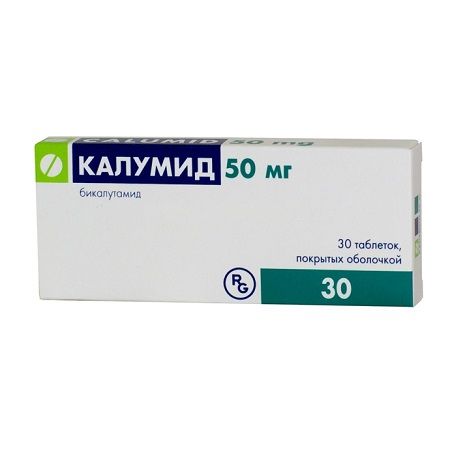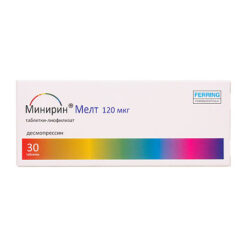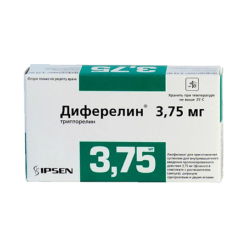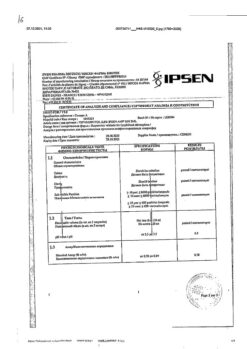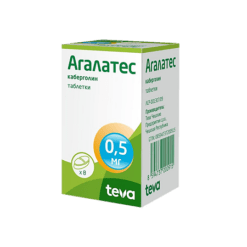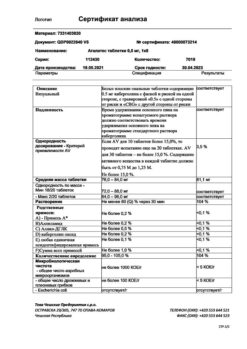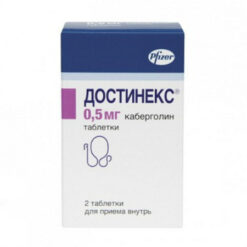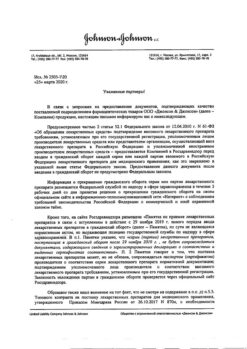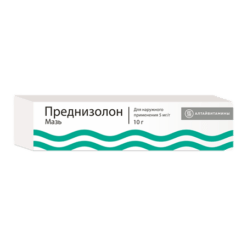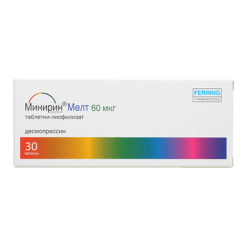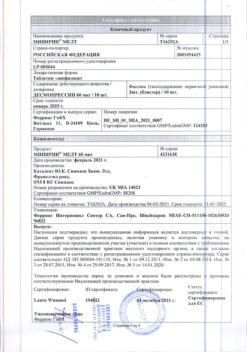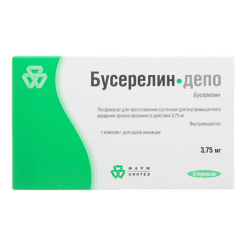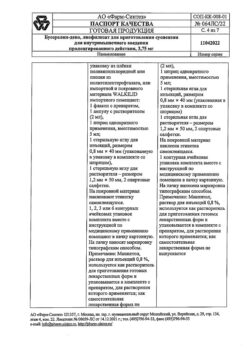No products in the cart.
Calumide, tablets 50 mg, 30 pcs.
€1.00
Out of stock
(E-mail when Stock is available)
Description
Calumide is an antiandrogenic nonsteroidal drug. It is a racemic mixture, and it is predominantly the (R)-enantiomer that has antiandrogenic activity.
It has no other endocrine activity. It binds to androgen receptors and, without activating gene expression, suppresses the stimulating effect of androgens. This results in regression of prostate malignancies. In some patients, discontinuation of bicalutamide may lead to the development of clinical “anti-androgen withdrawal syndrome.
Pharmacokinetics
After oral administration, it is quickly and completely absorbed from the gastrointestinal tract. Food intake has no effect on absorption.
The (S)-enantiomer is eliminated from the body much faster than the (R)-enantiomer, the half-life of the latter is about 7 days.
In daily administration of Calumid®, the plasma concentration of the (R)-enantiomer is increased by about 10-fold due to a long half-life, making once-daily administration possible.
When bicalutamide is taken daily at a dose of 50 mg, the equilibrium plasma concentration of:(R)-enantiomer is about 9 µg/ml. When bicalutamide is administered at 150 mg daily, the equilibrium concentration of the (R)-enantiomer is approximately 22 µg/mL. At equilibrium, about 99% of all circulating enantiomers in the blood are the active (R)-enantiomer.
The (R)-enantiomer pharmacokinetics are not affected by age, impaired renal function and mild to moderate hepatic impairment. There is data that in patients with severe hepatic impairment the elimination of (R)-enantiomer from plasma is delayed.
The binding to plasma proteins is high (for racemic mixture 96%, for (R)-enantiomer 99.6%). It is extensively metabolized in the liver (by oxidation and formation of conjugates with glucuronic acid). Metabolites are excreted by the kidneys and intestines in approximately equal proportions.
Indications
Indications
Active ingredient
Active ingredient
Composition
Composition
1 tablet contains:
Active substance:
bicalutamide 50 mg;
Associates:
colloidal silicon dioxide,
magnesium stearate,
povidone,
/p>
sodium carboxymethyl starch type A,
lactose monohydrate;
Composition of the shell:
Opadari II33G28523 white (glyceryl triacetate, macrogol 3000; lactose monohydrate, titanium dioxide, hypromellose).
How to take, the dosage
How to take, the dosage
Adult men (including elderly):
In advanced prostate cancer in combination with GnRH analogue or surgical castration: orally, 50 mg once daily. Treatment with Kalumid should be started simultaneously with the beginning of therapy with GnRH analogue or surgical castration.
In locally advanced prostate cancer: Orally, 150 mg once daily. Calumide should be taken long-term, for at least 2 years. If there are signs of disease progression the drug should be stopped.
Renal dysfunction: No dose adjustment is required.
Hepatic disorders: In mild hepatic impairment no dose adjustment is required. In patients with moderate to severe hepatic impairment increased cumulation of Calumid may be observed.
Interaction
Interaction
There are no data on pharmacokinetic or pharmacodynamic interactions between bicalutamide and GnRH analogues.
In in vitro studies, the (R)-enantiomer of bicalutamide has been shown to inhibit CYP ZA4, with less effect on CYP 2C9, 2C19 and 2D6 activity. No potential ability of bicalutamide to interact with other: medications was found, however, when using bicalutamide for: 28 days, with midazolam, the area under the curve “concentration-time” (AUC) of midazolam is increased by 80%.
Incompatible with terfenadine, astemizole, cisapride.
Caution should be exercised when prescribing Kalumid concomitantly with cyclosporine or calcium channel blockers. It may be necessary to reduce the dose of these drugs, especially in case of potentiation or development of side effects. Close monitoring of plasma cyclosporine concentrations and the patient’s clinical condition is recommended after starting or discontinuing Calumid.
The concomitant use of the drug Calumid and drugs that inhibit microsomal oxidation of drugs, such as cimetidine or ketoconazole, may increase the plasma concentration of the drug Calumid and may lead to increased incidence of side effects.
It potentiates the effect of coumarin anticoagulants, including warfarin (competition for binding to proteins).
Special Instructions
Special Instructions
With regard to the possibility of delayed excretion of Calumid, in patients with impaired liver function it is advisable to periodically assess liver function. Most changes in liver function occur during the first six months: treatment with Calumid.
In the event of marked changes in liver function, Calumid should be discontinued.
In patients with disease progression with elevated prostate-specific antigen (PSA) levels, discontinuation of Calumid should be considered.
In patients receiving coumarin anticoagulants, regular monitoring of prothrombin time is recommended when Kalumid is prescribed.
Patients with lactose intolerance should be informed that each tablet of Calumid 50 mg contains 63.875 mg of lactose monohydrate.
With regard to possible inhibition of cytochrome P450 (CYP WA4) activity by bicalutamide, caution should be exercised when concomitant administration of Calumid; with drugs predominantly metabolized with CYP WA4.
Impact on ability to drive vehicles and other mechanisms requiring increased concentration
When taking this medicine, caution should be exercised when driving or engaging in potentially hazardous activities requiring increased concentration and rapid psychomotor reaction.
Contraindications
Contraindications
Cautions: liver function abnormality; lactase deficiency, lactose intolerance, glucose-galactose malabsorption (the drug formulation contains lactose).
Side effects
Side effects
Cardiovascular system: heart failure.
Digestive system disorders: anorexia, dry mouth, dyspepsia, dysphagia, constipation, flatulence.
Nervous system disorders: dizziness, headache, insomnia, increased sleepiness.
Respiratory system: shortness of breath.
Urinary system disorders: nycturia, polyuria.
Hematopoietic system: anemia, leukopenia.
Skin and its appendages: alopecia, rash, increased sweating, hirsutism.
Laboratory disorders: hyperglycemia, increased activity of liver transaminases.
Other: abdominal pain, chest pain, pelvic pain, decreased or increased body weight, edema, diabetes mellitus, fever.
Overdose
Overdose
There have been no cases of overdose in humans.
There is no specific antidote.
The treatment is symptomatic.
Having dialysis is not effective because bicalutamide is firmly bound to proteins and is not excreted unchanged by the kidneys.
General supportive therapy and monitoring of vital body functions are indicated.
Pregnancy use
Pregnancy use
Contraindicated.
Similarities
Similarities
Additional information
| Shelf life | 5 years |
|---|---|
| Conditions of storage | At a temperature not exceeding 30 °C |
| Manufacturer | Gedeon Richter, Hungary |
| Medication form | pills |
| Brand | Gedeon Richter |
Related products
Buy Calumide, tablets 50 mg, 30 pcs. with delivery to USA, UK, Europe and over 120 other countries.

